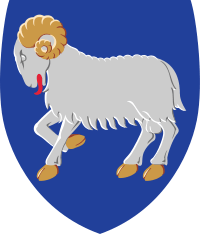2008 Faroese general election
General elections were held in the Faroe Islands on 19 January 2008, the latest possible date. The Self-Government Party and the Centre Party gained a seat each while the Social Democratic Party lost a seat. The number of women went from three to seven.[1]
| ||||||||||||||||||||||||||||||||||||
This lists parties that won seats. See the complete results below. | ||||||||||||||||||||||||||||||||||||
| ||||||||||||||||||||||||||||||||||||
 |
|---|
| This article is part of a series on the politics and government of the Faroe Islands |
|
|
|
The unity of the Realm
|
|
Regeringen
The Government of Denmark
Landsstýri
The Government of the Faroe Islands
Privy Council
|
Folketinget
Parliament of the Kingdom of Denmark (69th Kingdom Parliament)
|
|
|
Foreign relations
|
|
Related topics
|
It had been considered to amend the election law to hold the election two weeks later to pass a number of important bills before the election, but in the end the negotiations on this failed and the election was called on 2007-12-07.[2][3] Prior to this election, the electoral system was changed in 2007 from a constituency-based d'Hondt proportional representation (with seven multi-member constituencies), which had some elements of mixed member proportional voting, to a nationwide d'Hondt based proportional system to reduce disproportionality.[4]
Prior to the election, the Social Democratic Party formed a centrist unionist government with the People's Party and the Union Party. After the elections, four days of negotiations saw a centre-left separatist government emerge; while the Social Democratic Party retained the PM's post, the strongly pro-independence Republic got the majority of ministerial posts (including the newly created post of foreign minister). The Centre Party also participated in the new government. Among the coalition agreement points was a plan to draft a constitution for the Faroe Islands, which would be approved in a referendum to be held in 2010.
The coalition broke up in mid-2008, however, and a government consisting of the parties governing before the 2008 election was sworn in on 26 September 2008, with Kaj Leo Johannesen as PM instead.[5]
Results

| Parties | Votes | % | Seats | |
|---|---|---|---|---|
| Republic (Tjóðveldi) | 7,250 | 23.3 | 8 | |
| Union Party (Sambandsflokkurin) | 6,529 | 21.0 | 7 | |
| People's Party (Fólkaflokkurin) | 6,240 | 20.1 | 7 | |
| Social Democratic Party (Javnaðarflokkurin) | 6,018 | 19.3 | 6 | |
| Centre Party (Miðflokkurin) | 2,610 | 8.4 | 3 | |
| Self-Government Party (Sjálvstýrisflokkurin) | 2,244 | 7.2 | 2 | |
| Students' Party (Miðnámsflokkurin) | 221 | 0.7 | 0 | |
| Totals (electorate 34,845 : turnout 89.7% ) | 31,112 | 100.0 | 33 | |
| Source: logting.elektron.fo (turnout includes invalid votes; other figures exclude invalid votes) | ||||
See also
- List of members of the Løgting, 2008–11
References
- Nýggja løgtingið valt - stór útskifting og fleiri kvinnur Kringvarp Føroya, 20 January 2008 (in Faroese)
- Faroese election Norden, 10 December 2007
- Faeroes to head to polls The Copenhagen Post, 7 December 2007
- Elections to the Faroese Løgting Election Resources on the Internet
- "Archived copy". Archived from the original on 2011-05-24. Retrieved 2008-10-02.CS1 maint: archived copy as title (link)